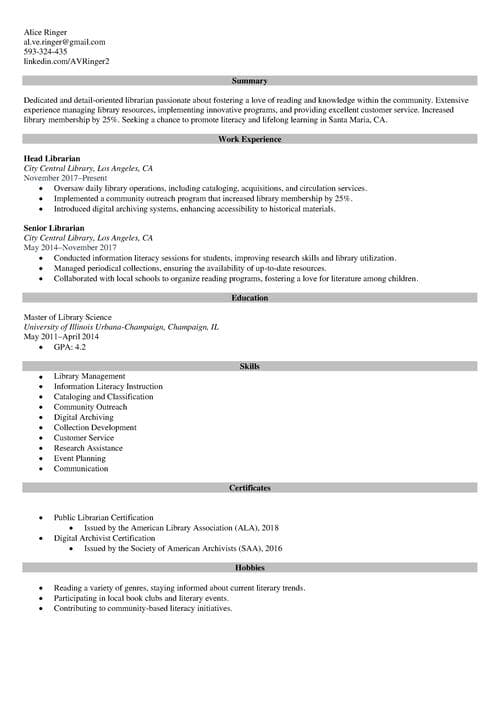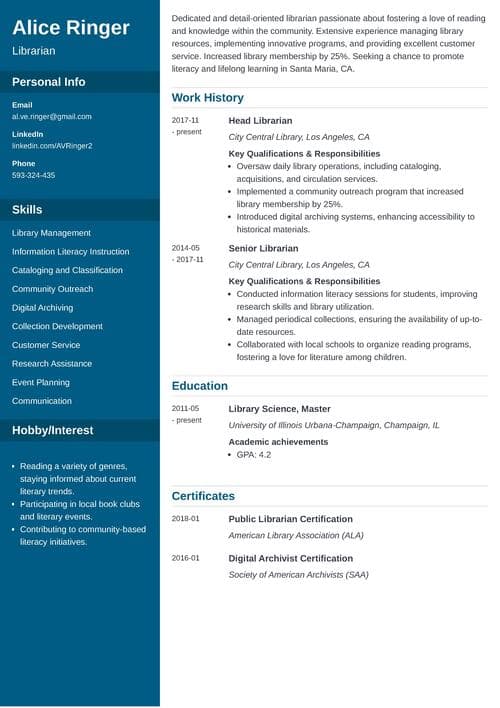40+ Interview Dos and Don'ts: Tips for 2024
Create Your Resume NowYou’re about to enter the office with a hiring manager. Your resume and cover letter have made enough impression on the recruiters that they decided to invite you for an interview. It’s the final round before they decide whether to hire you or not.
There are some things worth remembering in a situation like this that can boost your chances of landing that job. It’s job applicants’ 101. The interview dos and don'ts. Worry not, they are here for you.
This guide will show you:
- Interview dos and don'ts during different parts of the recruitment process.
- How to prepare for the interview.
- What are some dos and don'ts during a job interview.
- How to reduce stress and anxiety related to the upcoming interview.
Want to save time and have your resume ready in 5 minutes? Try our resume builder. It’s fast and easy to use. Plus, you’ll get ready-made content to add with one click. See 20+ resume templates and create your resume here.
Sample resume made with our builder—See more resume examples here.
Looking for other tips on how to land the job you’re after? Read our guides:
- Interview Tips & Tricks
- Second Interview Questions
- Phone Interview Questions
- Informational Interview
- Prepare for an Interview with Recruiter
- Internship Interview Questions
- Interview Questions for Managers
- Illegal Interview Questions
- What Are Your Weaknesses
- How to Make a Resume
Job Interview Dos and Don’ts
The interviews are often seen as high-stakes situations, and they cause many people to experience nerves and anxiety. Did you know that, according to the survey, 93% of job candidates feel anxious about the process? No wonder why. It's the moment during which you're trying to convince the other party that you are exactly whom they are looking for. Even preparing for an interview may cause stress. Whether you’re applying for your first job or you’re seeking to progress to the next level, 1:1 with a recruiter or your future superior can be stressful. Learning the basic job interview dos and don’ts can help you fight the anxiety and look good and professional for recruiters.
Preparing for the Interview
Remember, the more prepared you are, the calmer you will be. What you do before the interview can set your mood and reduce your stress during a conversation with your recruiter. That’s why it is so important to take time and start preparing for the meeting ahead. From what you wear to what you bring with you, everything can have an impact on how well you will perform.
Dos:
- Do prepare for the interview (duh!). But don’t do that right before you leave the house. Take some time and remember that it can be beneficial to sleep on the decisions you’ve made. That’s why the last moment to prepare for an interview is the night before. It will allow you to wake up ready to win!
- Do get a lot of rest the night before. Nothing will assure you more that you are fully ready for an interview than a good night of sleep.
- Do pick an outfit. Dressing professionally for an interview is not only how you look, but it's also how you feel. Choose simple yet comfortable clothes that will not distract the recruiter from what you have to say. Unless you're applying for a more creative position. In that case, dress tidily but try to stand out a bit.
- Do remember about… well, pretty much everything. What can be helpful in that situation is creating a checklist of what to bring for an interview. And that includes:
- Your printed resumes. Yes, plural, as you might be surprised by the number of people in the room. The recruiter probably has one, but having hard copies of it will allow you to look more professional.
- A professional-looking bag. It sends a simple message of you being prepared for many scenarios.
- A pen and a notebook or a laptop. Hence, the bag.
- Breath mints. Better safe than sorry.
- Do make sure you have your device fully operating and fully charged, if you're having an online interview. Nothing says I am unprofessional more than a sudden urge to dive under the desk for a charger. And make sure you sit comfortably, and the lighting is good. Also, test the camera, microphone, headset, and all the necessary apps.
- Do make sure you have directions to where your interview takes place. Also, check how long it will take you to get there in the worst-case scenario. Then add 15 minutes to it. Having a quick stroll around the company premises is better than being late.
- Do research the company’s social media and pages. Learn a bit about its history, and try to find its mission statement (which can usually be found in the About us section on its website). View their recent developments. That way, you will not be surprised by any basic questions, such as Why have you decided to choose our company?
- Do try to learn what would be the format of the interview. It can be a traditional one, but it can also be a screening interview, a panel interview, or a group interview. Learning that beforehand will allow you to feel more comfortable.
Don’ts:
- Don’t prepare for the interview on the same day. Doing anything on the last notice is never a good idea. You can’t predict all the unexpected difficulties. And preparing in a hurry may lead to unnecessary stress. And you don’t need any more stress, do you?
- Don't dress down. It can send a message of disrespect for the recruiter and for the company. And no one wants to hire someone who doesn’t try.
- Don’t be late. If you’re late for an interview, are you going to be late every day and with every assignment? That’s not us asking, but it’s the question that might (and most probably will) pop into a recruiter’s head.
Pro Tip: Some job offers have good to have requirements. Be proactive and try to get them or at least wrap your head around them before the interview so that you'll be in the process of learning them when the recruiter asks you about them!
Making the First Impression
Appearing confident, professional, and just the right fit can be stressful. There are some things you might want to remember to enhance your confidence. Firstly, remember that they’ve already invited you for an interview. It means the first impression you’ve made with your resume and how you sold yourself with a cover letter was done well.
Dos:
- Do turn off or mute your mobile phone. A sudden ringtone or even an awkward vibration is a great distraction for both you and the recruiter.
- Do… be polite! Seems like knowledge from primary school, but you’d be surprised how many people tend not to greet the receptionist. And that’s a horrible first impression!
- Do shake hands firmly, keep eye contact, and smile. That’s how you boost your confidence in both yours and their eyes!
- Do wait until you’re offered a place to sit. And once you sit, sit straight, don’t cross your hands. Think of how you’d sit at the desk in the Oval Office with cameras all over and your mom watching a live transmission. You get the picture, right?
- Do think of how to introduce yourself professionally. Sharing too much and being negative, i.e., about the traffic, is never a good way to start a relationship!
Don’ts:
- Don’t assume that you're already hired. Your friends might enjoy a bit of cockiness but a recruiter might find that annoying at best and unprofessional at worst. And probably both.
- Don’t eat or chew gum. Obviously!
- Don’t fidget. Making unnecessary movements give the impression that you are stressed and nervous. And you will feel more stressed and more nervous.
Answering the tell me about yourself question seems impossible to do once you suddenly hear it. But you can nail it with our guide: Tell Me About Yourself Interview Question
Answering the Interview Questions
Giving the correct answers to all the questions you’re being asked during an interview is perhaps the most stressful part. However, all of these common interview questions were probably asked before, and therefore there’s a good chance of answering them correctly!
Dos:
- Do practice your answer to common interview questions and to situational questions. Being prepared is how you avoid being surprised. And therefore, how you reduce the chances of a sudden anxiety attack!
- Do ask for help. A wife, a husband, and a friend can all act as your interviewer. Just try to stay in your roles and ask them for honest feedback. That way, you will know how you shape your answers. That will allow you to avoid poor language or unnecessary pauses.
- Do listen carefully and think before you answer. Asking a recruiter to repeat the question can make them think you don’t listen and, therefore, don’t care. Also, expressing the need to consider the answer is always better than an awkward silence and an awkward ummm sound.
- Do try to answer all the questions while highlighting your skills, your experience, and your traits. Remember, it’s not a casual conversation, you’re trying to sell yourself. Don’t be unnecessarily modest!
- Do… be positive! Whether you’re talking about your previous employer or about how you are feeling today, try to keep a smile on your face. An honest smile can make someone else smile, and feel better about themselves and about the situation they're in. And you do want to make them feel great about the interview!
Don’ts:
- Don’t forget to listen. Staying focused is your priority. Without it, you won’t be able to answer questions, make a great impression, sell yourself and get the job. So what’s the point?
- Don’t mumble. Speaking clearly is another thing that helps you feel and appear more confident.
- Don’t interrupt the recruiter
- Don’t be negative. Say anything negative about your former employer or colleagues makes others think you might say something negative about them in the future. It’s also very unprofessional at this stage. And also, don’t say anything negative about yourself. Remember, you’re the best. That’s what they need to feel!
- Don’t answer questions with simple yes and no. Go deeper, explain, use examples of your achievements, and even quote if you can! All whilst trying to highlight why you’re the perfect fit! But do not overkill it, as too elaborate answers can do more harm than good!
Pro tip: Your recruiter might ask you some behavioral questions. Plan your answers according to the STAR method. That's Situation—Task—Action—Result and applying it to those questions can show them you’re a real pro who’s well-prepared!
Creating a resume with our builder is incredibly simple. Follow our step-by-step guide and use content from Certified Professional Resume Writers to have a resume ready in minutes.
When you’re done, Zety’s resume builder will score your resume and our resume checker will tell you exactly how to make it better.
Asking the Right Questions
There comes a moment during every interview when the recruiter asks you whether you’ve got any questions. And even if everything seems clear, it’s always a good idea to ask some. That’s how you show you listen and think. And that’s how to show you’re interested.
Dos:
- Do ask questions about the company. Sure, you probably know a lot about it from their website, their social media, and general research. But giving a detailed question about the vision, goals for the future, or the market the company is in shows that you’re interested and that you’ve thought this through.
- Do ask questions about the position. Sure, it’s all in the ad, probably. But giving a follow-up question to what was written there or to what the recruiter has said is another way of how you show you’re truly interested!
- Do ask questions about the team. Sure, they mentioned it. But asking about who you’d be working with, what’s the structure, and who you respond to directly can prepare you for your future employment, And, again, shows you’re interested!
- Do ask about the next steps. Who should you stay in touch with, are there any more interviews or tasks ahead of you, and when can you expect to hear from them are a must.
- Do take notes. It will help you review the conversation later and ask the next questions. All that while showing—you guessed it—you’re very much… curious about the opening!
Don’ts
- Don’t ask personal questions. The recruiter is not (yet!) your colleague. Keep it professional.
- Don’t ask about the salary. Now is not the time to give an impression that you’re in only for the money.
- Don’t ask questions about vacations, day offs, or parties. You don’t want to look like someone who can’t wait for some extra free time!
There are a lot of good questions to ask the interviewer. See some examples: Questions to Ask an Interviewer
After the Interview
Now that the interview is concluded, there are some things you need to remember in order to leave the recruiters with a carefully achieved great impression of yourself. After all, you don’t want to make it all crumble and fall while saying goodbye to both the interviewer and the job, do you?
Don’t worry. It’s the easiest part.
Dos:
- Do write a thank you email after an interview to all the participants within a day of it. Express your gratitude and excitement regarding the future message! Remain confident.
- Do write a follow-up email after an interview if you don't get the answer within a week. Include your resume and cover letter.
- Do stay in touch with the company. Do that even if you don’t get the job. Networking is more important than ever, and who knows, they might come back to you in the future!
Don’ts:
- Don’t forget to remain polite and professional, no matter the final decision.
And that’s it. The interview preparation 101. That should help you nail the interview. But sometimes even the best preparation doesn’t help you with the stress.
How to Reduce Your Stress
According to the previously mentioned survey, there are several ways Americans choose to relax before a job interview. Here are the results:
- Listening to music (64%). According to the study, music can decrease cortisol (stress hormone) levels and increase serotonin and endorphin levels in the blood. Put on your headphones, play your favorite record, and relax!
- Visualization (41%). It’s a stress management technique during which a person imagines an attractive and peaceful setting or environment. A happy place that helps you calm down.
- Using a mantra or positive self-talk (29%). Quietly repeating a mantra helps calm the nerves and prevents the mind from thinking of worst-case scenarios.
- Meditation (23%). Focusing your attention can help you not only reduce your interview-related stress but also enhance your physical and emotional well-being.
- Exercising (23%). Physical exercises pump up your endorphins. Boosting them is reducing your stress!
- Power posing (9%). Feeling powerful, confident, and positive can work magic when facing a situation that requires a large amount of those traits!
- Making a gratitude list (6%). Listing all the things you’re grateful for boosts your endorphins and makes you happy as you realize that life’s good. And there’s no need to worry! You got this!
There’s no need to worry. You got this.
Plus, a great cover letter that matches your resume will give you an advantage over other candidates. You can write it in our cover letter builder here. Here's what it may look like:
See more cover letter templates and start writing.
Key Takeaways
As you can see, there are several things you need to remember in order to prepare yourself for the interview. Here are the ones that apply to every scenario, every situation, and every stage:
- Be polite. Always.
- Try to remain calm. It can be difficult, but you’ve got some tools to reduce the stress.
- Be confident. You got invited, which means they are potentially interested in your candidacy!
And seriously. You got this.
Thanks for reading our article. If there are any questions or more suggestions on how to prepare for a job interview, let’s discuss them all in the comment section below!
About Zety’s Editorial Process
This article has been reviewed by our editorial team to make sure it follows Zety's editorial guidelines. We’re committed to sharing our expertise and giving you trustworthy career advice tailored to your needs. High-quality content is what brings over 40 million readers to our site every year. But we don't stop there. Our team conducts original research to understand the job market better, and we pride ourselves on being quoted by top universities and prime media outlets from around the world.





![[Redirected] 20 Most Common Interview Questions and the Best Answers](https://cdn-images.zety.com/pages/man_answers_tough_job_interview_questions.jpg?fit=crop&h=250&dpr=2)

